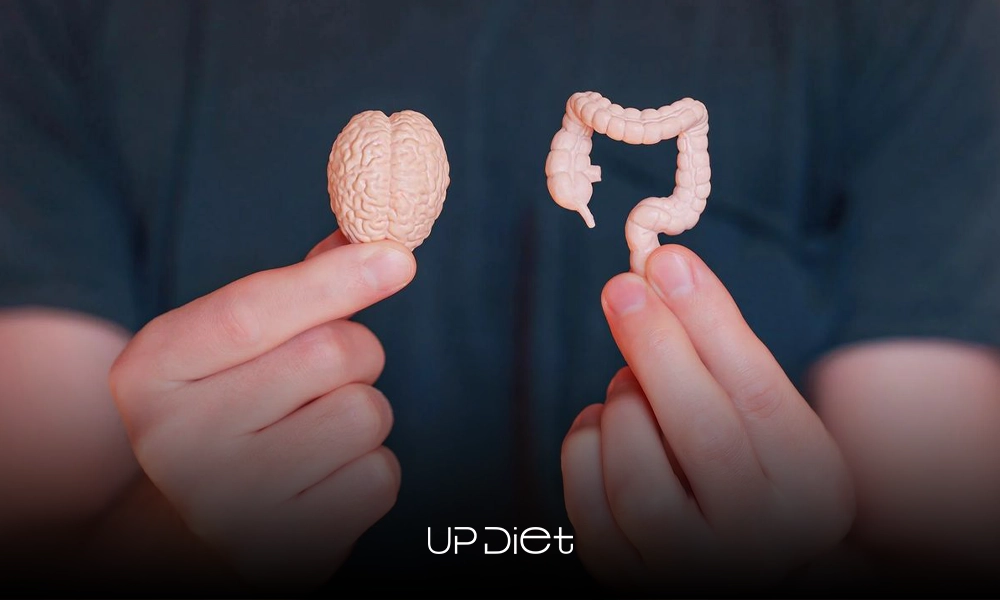Get a plan made for your unique body and goals
Gut Microbiome and Mental Health: How Your Gut Influences Your Brain

“Your gut is your second brain” sounds like a catchy headline, right? Well, scientists have a good reason to call it that: it has over 100 million neurons that work independently from the brain! And this is why there’s a link between gut microbiome and mental health.
Let’s explore this extraordinary connection in detail and see what foods/habits support both gut and mental health.
Understanding the Gut-Brain Axis
The gut and brain communicate through a two-way network of nerves, hormones, and microbes called the gut-brain axis.
The vagus nerve sends instant signals between the two, while hormones and immune messengers carry chemical updates through the bloodstream. At the same time, the gut microbes produce specific compounds that tune mood, stress responses, and cognition.

How Gut Bacteria Affect Mood and Mental Health
Gut microbes don’t feel emotions, but they do shape the environment that regulates our emotional circuits. They influence the mood (for better or worse) mainly by…
- Neurotransmitter makers: Some bacteria produce or modify mood-related chemicals such as serotonin, dopamine, GABA, and glutamate, which directly affect emotional balance.
- Fiber fermenters: When microbes digest dietary fiber, they release short-chain fatty acids (SCFAs) that support the blood-brain barrier and calm brain inflammation.
- Immune balancers: A disrupted microbiome, or “dysbiosis,” triggers the release of inflammatory molecules such as IL-6 and TNF, which interfere with brain signaling and mood regulation.
- Nerve messengers: Microbial by-products and hormones activate the vagus nerve, which sends fast, mood-related signals from the gut to the brain.
Gut Bacteria and Depression: What Research Shows
Evidence links gut dysbiosis with higher rates of depression and anxiety. Some of these promising, but not yet definitive, studies are:
- Observational studies have found that people with depressive episodes often have distinct microbiome profiles.
- Interventional trials showing dietary improvement (such as Mediterranean-style interventions) and some probiotic/prebiotic RCTs can reduce symptoms.
- In animal studies, scientists transfer “unbalanced” gut bacteria to healthy rodents, and they start showing depression-like behaviors.
- Human studies also showed that dysbiosis disrupts tryptophan metabolism and increases inflammation, both of which are associated with low mood and higher stress.
With the proper gut bacteria depression diet, you can nourish beneficial microbes to restore balance and diversity. This will naturally boost your mood and brain function, too.

Best Foods for Gut and Brain Health
Balanced eating plans (such as Mediterranean or whole-food diets) have the most substantial evidence. Overall, the pillars of a gut bacteria depression diet are:
- Probiotic/fermented foods: yogurt, kefir, kimchi, sauerkraut, fermented dairy (kefir and kefir-like drinks).
- Prebiotic/fiber foods: legumes, oats, onions, garlic, leeks, bananas, asparagus, whole grains.
- Polyphenol-rich plants: berries, citrus, dark chocolate, green tea, colorful vegetables.
- Omega-3 sources: fatty fish (salmon, mackerel), chia, flaxseed, walnuts.
Foods and Habits That Harm the Gut-Brain Connection
To protect your gut-brain axis, you need to maintain microbial diversity and prevent pro-inflammatory signaling. Here are some helpful tips for that:
- Limit ultra-processed foods, trans fats, sugar, and refined carbs.
- Avoid heavy alcohol intake. (Find out why on this MD Andeson Center article)
- Only take antibiotics when necessary.
- Manage chronic stress and poor sleeping habits.

Practical Tips for a Gut-Mental Health Diet
- Aim for a varied, plant-forward plate with 25 to 30 grams of fiber per day from whole grains, legumes, fruits, and vegetables.
- Balance each meal by adding protein, fiber, and healthy fats to stabilize blood sugar and feed microbes.
- Add fermented foods to your meals 3 to 7 times per week. For supplements, it’s best to consult with your health care provider first.
- To supply your body with the omega-3 it needs, have 2 to 3 servings of fatty fish or plant sources every week.
- Swap processed, sugary snacks/drinks for water, tea, and whole snacks like nuts or fruits.
- Stay hydrated and prioritize quality sleep.
- Practice mindful eating and stress reduction techniques (breathwork, short walks).
- In this post:
- Understanding the Gut-Brain Axis
- How Gut Bacteria Affect Mood and Mental Health
- Gut Bacteria and Depression: What Research Shows
- Best Foods for Gut and Brain Health
- Foods and Habits That Harm the Gut-Brain Connection
- Practical Tips for a Gut-Mental Health Diet



